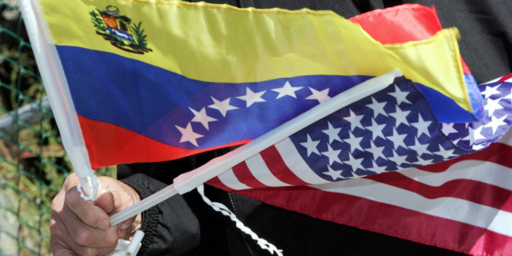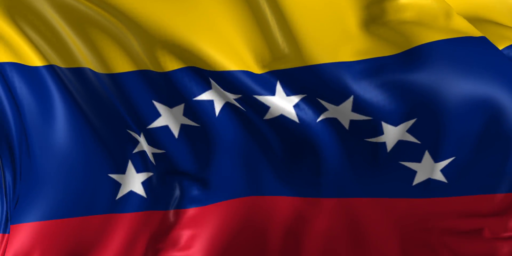Questions about Venezuela?
Steven L. Taylor
·
Sunday, February 23, 2014
·
25 comments
Since I figure most folks only have a passing knowledge of Venezuela, I was curious if there were any specific questions about that I could attempt to answer. I cannot guarantee that I can provide the answers, as I am not a country-expert on this topic, but ask away and we will see.

About Steven L. Taylor
Steven L. Taylor is a Professor of Political Science and a College of Arts and Sciences Dean. His main areas of expertise include parties, elections, and the institutional design of democracies. His most recent book is the co-authored
A Different Democracy: American Government in a 31-Country Perspective. He earned his Ph.D. from the University of Texas and his BA from the University of California, Irvine. He has been blogging since 2003 (originally at the now defunct Poliblog).
Follow Steven on
Twitter





Why does oil-rich socialist Venezuela perform worse than neighboring, pro-free-market Colombia, on measures such as life expectancy and infant mortality, even though Venezuela has massive oil wealth and Colombia doesn’t? (I am citing figures from the World Almanac).
In 1999, just before Marxist Hugo Chavez took power in Venezuela, life expectancy was 3 years longer in Venezuela than in Colombia. But after 14 years of socialist rule, life expectancy in Venezuela is now almost a year shorter than in Colombia. (These figures are from the World Almanacs for 1999 and 2014.)
Improvements in life expectancy have stalled in Socialist Venezuela even though Venezuela, unlike Colombia, has vast oil wealth, and benefited from rapidly-rising oil prices during Chavez’s rule, enabling Venezuela to dramatically increase government health care spending (a fact that has not prevented Venezuela from having a higher infant mortality rate than neighboring Colombia).
How much of Colombia’s advantage in life expectancy owes to the staggering murder rate in Venezuela — with the Venezuelan capital of Caracas being one of the world’s most dangerous and crime-ridden cities? How much owes to other factors?
@Hans Bader: I get the impression that you think I am a supporter of the regime. This is not the case.
I would agree that Chavez’s economic model is an utter mess.
I don’t the impression that you are are asking questions as much as trying to make a point.
I’ve seen Chavistas and supporters claim that many of the economic problems are the result of currency manipulation and hoarding by elites. Is there any evidence to support that? There is apparently evidence of this happening in the past, and I wouldn’t put it past the opposition, who seems intent on using any and all levers to drive Maduro out. But I also wouldn’t discount it being mostly a self-serving story.
Here’s Eva Golinger:
http://www.chavezcode.com/2014/02/venezuela-beyond-protests-revolution-is.html
Any hard evidence on this score one way or the other?
@Hans Bader: I’m not sure I would be holding up Colombia as a regional example to be emulated, if I were you. Have you been following the “false positive” scandal there? Ugly stuff.
http://en.wikipedia.org/wiki/%22False_positives%22_scandal
@Tim D.: I know of no hard evidence to demonstrate that the shortages are anything other than a direct result of bad economic policies.
How big of a base of support does Maduro have? In Ukraine, support for both sides fall on both geographic and cultural/economic lines. How much of the base that supported Chavez is still left?
Well, I mean a quick Google turns up a bunch of links. This one has photos of the alleged warehouses.
http://axisoflogic.com/artman/publish/Article_65743.shtml
I have no idea whether that link is a reputable source or not. Like most of the discussion on this topic, sources are highly polarized and hard to interpret unless you’re a regional expert. It may be that hoarding is basically a lie, or that it is occurring but not at the scale that would make a difference, or that selected shortages are being hyped in the media to create the impression of chaos. Lots of ways to interpret it.
@Neil Hudelson: The division is class based in Ven rather than geographical.
In terms of support, Maduro almost certainly has majority support. The opposition is in the minority, but it is a large minority.
@Steven L. Taylor:
If this is true — that Maduro has majority support — then why was Maduro’s election victory so narrow? (Even assuming it was genuine and not fraudulent, and putting aside the Venezuelan government’s tight control over the media)?
More importantly, with severe economic shortages worsening in recent months (and skyrocketing inflation), isn’t it plausible that even if he had the support of a narrow majority of Venezuelans in the last election, he no longer has majority support, due to dwindling popularity?
Bush and Obama both won reelection with a narrow majority of the vote, but both then declined in the polls thereafter, to the point where Bush obviously lacked majority support by 2007, and Obama probably lacks majority support now, although the GOP’s disarray and demographic weaknesses keep it from taking advantage of Obama’s decline in the polls.
Do you not understand what a majority is? 50%+1. You don’t have to have a large majority to still be the majority.
@Hans Bader: The fact of the matter is that there is not an effective, coherent opposition in Venezuela, and there hasn’t been since pre-Chavez.
This is not a judgment, but an empirical observation.
Here are some more questions: To what extent is the “opposition” united either around policy, or process questions? Will the students in the streets really line up behind Capriles and Lopez? Is this truly a conservative backlash against chavismo or are those politicos just being opportunistic? Alternately, who here really wants “La Salida” (i.e. an un-democratic coup) as opposed to an electoral resolution?
@Hans Bader:
The question you should be asking is why the Socialist Hell that is the EU has a higher life expectancy and lower infant mortality rate than the pro free-market US. Don’t think any of the countries in the EU has a massive oil wealth (Norway has yet to join the EU), but they all seem to have universal health care, stricter gun laws, and a lower homicide rate…
@Tim D.: There are a variety of reasons not to pretend like Colombia is some sort of paradise. I have no problems saying that Colombia is better off that Venezuela in any number of ways (and I can claim substantial knowledge of that case). However, I feel like Hans is less trying to engage in a discussion and more is just trying to make a simplistic point.
@Neil Hudelson:
My point was mostly that even if Maduro had a narrow majority of support at the time of the last election, it is doubtful that he still does now, because if even a small percentage of the people who voted for him then have soured on him, then he lacks majority support. (Of course, validly elected leaders are such even though they no longer command majority support. Whether Venezuela, where the regime had effective control of the media, and employed intimidation tactics and overwhelming state resources to increase its tally, had such free and fair elections is another question).
As someone who once worked producing statistics (for the government), I of course understand that 51% qualifies as a majority, even if it is a narrow majority.
@Hans Bader: A true difficulty in making that calculation (and I understand your basic point) is that it assumes that a loss of support for Maduro leads to increased support for the opposition. This is problematic because a) there is no singular opposition (e.g, the Lopez faction, Capriles, etc), and b) you are also equating loss of support for Maduro with loss of support for the current political order, which may not be the same thing.
It does not appear to me to be the case that loss of support for Maduro leads to a particular gain in support for a unified opposition and, more importantly, I do not (at this point) see majority opposition to the regime itself.
@Steven L. Taylor:
The question is WHY Colombia would be “better off than Venezuela in any number of ways,” given the huge advantage that Venezuela has in being an oil-rich country.
To me, it seems obvious that one reason is that Venezuela has a socialist government (which mismanages the economy), and Colombia does not. But maybe there are additional reasons that might occur to you, since you have a different perspective,
In response to PJ: By “socialist,” I don’t mean having a mere social safety net, like the U.S. or Europe
(Prosperous European countries aren’t really that much more “socialist” than the U.S. A few actually outrank the U.S. on measures of economic freedom like the World Economic Forum competitiveness index, or the Index of Economic Freedom. They may have universal healthcare systems — compared with the U.S., where only a narrow majority of healthcare spending is by state or federal governments through Medicaid and such — but in some other respects, countries in Northern Europe are more pro-free-market than the U.S.. Supposedly socialist Sweden actually has more free trade, less occupational licensing regulations, less bailouts, and more school choice than the U.S. Their legal systems also redistribute less wealth in places like Germany, where business litigation often makes more sense. Moreover, even in countries like France, the healthcare system may be single payer, but most doctors are not employed by the government, and many hospitals are private. Finally, living standards remain lower in almost all of Europe than the U.S., since Europeans generally have less living space than the average American, and energy, utilities, and clothing cost much more there relative to their income.)
@Tim D.:
You have obviously never made an omelette.
Also, if these 3,000+ civilians had lived, then Colombia’s mortality rate would have been even higher than Venezuela’s!
@Hans Bader: As I have noted, the Venezuelan model is a mess. I am not arguing otherwise. I just find that you seem to be trying to make some sort of simplistic ideological point that is not necessary for this conversation.
Venezuela’s economy was fairly well botched despite the oil wealth in pre-Chavez times–that is what lead to the first Caracazo and the demise, ultimately, of the pre-Chavez political order.
What point, exactly, are you trying to make in raising the Col-Ven comparison? It seems that it is rather easy to demonstrate the failings of Venezuela’s economy without making some simplistic comparison,
(And I say this with every reason in the world to be a Colombia booster, having lived there and having studied and written about it for two decades+).
@Hans Bader:
So, Republicans and Fox News are all lying?
@PJ: the eu s not a country, and their collective healthcare system is nothing like ours- we’re not that bad yet. there’s a reason that the wealthy flock to America for serious healthcare issues just as there’s a reason that brits are stereotyped as having horrible teeth. and neither has much to do with venezuela’s state of disaster.
@bill:
The EU isn’t a country nor does it have a collective healthcare system, but each of my points could be said about most of the countries that are members of the EU, especially the most socialistic hell holes of them.
The wealthy of Europe flock to America for serious healthcare issues? How wealthy would they be? And do you have any actual links to show this to be true? Because I see this line parroted quite often, but I’ve never seen any proof for it.
Stereotyped is the word. Here’s a link for you to read. Compare the UK and the US.
Here’s my question, Steven. How’s this likely to play out? Isn’t Chavismo popular among the urban poor? Don’t they outnumber the middle class who constitute much of the opposition?
Dr. Taylor,
What does the protest movement actually want? Do they want a resignation? A shuffle of positions? From here, I can’t tell what they are unhappy about, exactly.
Is there any way Meduro gets kicked out? In other words, can the opposition muster the guns for a coup? And if they did, how destabilizing would that be, considering they are still the minority? Would the new government be subject to the opposition’s demonstrations, like we’ve seen in Thailand?
Finally, do you see any situation that would eat away at Meduro’s base? If the crack down continues, or gets worse, would the former supporters of Chavez say they were done with Meduro?
What is the political nature of the opposition? What level of unity exists, and if there is little, what is the potential for a coalition to form?